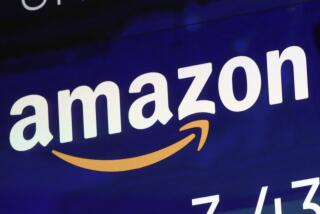If Your Interest in PCs Is Personal . . .
- Share via
After computer powerhouse Hewlett-Packard Co. (ticker symbol: HWP) announced poor fiscal-second-quarter sales and order growth recently, it looked as if personal computer stocks’ sizzling run-up of the last three years was suddenly over.
HP credited part of its disappointing results to weaker PC sales, and that sent shares of it and other PC makers into a tailspin. It was a rude setback: Standard & Poor’s index of computer shares had surged 125% over the preceding three years, far outpacing the 76% gain of the broader S&P; 500.
But it’s not for nothing that Wall Street sees PC stocks as volatile. Within a couple of sessions, stocks of most other PC companies--such as Compaq Computer Corp. (CPQ), Dell Computer Corp. (DELL) and Gateway 2000 Inc. (GTW)--were soaring again, with all three flirting with new 52-week highs.
What’s going on here?
The consensus is that the PC industry, of which no one player has a dominant share, is still robust, but that Compaq, Dell and Gateway are doing a better job of selling PCs efficiently and at the lowest cost possible.
“No one ever knows exactly how fast the PC market is growing; some say 18% to 20% [in units sold], and some say in the low teens,” said T. Peter Andrew, analyst at A.G. Edwards & Sons Inc. in St. Louis. “Regardless, people are convinced that the PC market is strong, and that’s propelling the stocks forward.”
But Compaq, Dell and Gateway are raising the bar in being efficient manufacturers and distributors, which gives them an edge over others such as HP and struggling Apple Computer Inc. (AAPL) in continuing to slash prices yet still turn a profit and maintain market share, said analyst Richard Chu of the investment firm Cowen & Co. in Boston.
That’s why Compaq’s and Gateway’s stocks have more than doubled in price over the last 12 months, and Dell has more than tripled to $107.25 on the Nasdaq stock market.
To be sure, HP is a multifaceted company compared with more pure PC plays such as Compaq, Dell and Apple. HP also has big interests in larger computer systems, printers and testing equipment, and that also played a role in its disappointing quarter, in which revenue rose only 5% from a year earlier.
Nonetheless, HP is “now up against some tough [PC] players, and I’m not convinced they have been as aggressive . . . in doing business in the most efficient fashion possible,” said Chu, who removed his “buy” rating on HP even though he still regards it as a premier company with a long-term future.
And anything less than low-cost production won’t wash this year, said analyst John Dean of Salomon Bros. Inc. in New York, because all the factors that define the PC business--ferocious competition, rampant price cutting that erodes profit margins and a never-ending onslaught of new technologies--have resurfaced in 1997 after being somewhat dormant last year.
“We expect the PC industry to become more like the PC industry during 1997,” Dean wrote recently.
So for now, the analysts’ bullishness is set on Compaq, Dell and Gateway. Compaq--which led the industry by shipping 11.1% of total worldwide PC shipments in the first quarter of the year, according to the research firm International Data Corp.--gets raves for repeatedly sending new, more powerful technology to the market while pushing its retail prices lower.
Andrew has had a “buy” recommendation on Compaq for several months, even though the stock has risen sharply, in part because Compaq still trades for only 16 times its expected earnings per share this year.
“Historically, PC stocks trade from 10 to 15 times their next four quarters’ results, but now that paradigm is starting to change, and people are willing to look at higher valuations,” Andrew said.
There also have been recurring reports that Compaq has considered buying Gateway, although nothing definite has been announced.
Gateway and Dell get high marks because they specialize in “direct marketing,” meaning they ship their machines directly to the customer without using a third-party distributor. That helps keep their costs down.
And Dell, based in Round Rock, Texas, validated their views last week by announcing that its fiscal first-quarter profit more than doubled from a year earlier, a much stronger gain than Wall Street had projected.
Dell also announced a 2-for-1 stock split that’s subject to shareholder approval at the company’s annual meeting July 18, and both developments sent the stock soaring to the recent $107.25 a share.
“We believe Dell maintains the strongest near-term outlook of all the PC stocks,” said analyst Kimberly Alexy of Lehman Bros. in New York.
But Gateway moved to keep pace, and it also announced a 2-for-1 split, effective in mid-June. The seller of popular home PCs also launched a program to buy back 10 million shares with periodic purchases, and last week moved its shares to the New York Stock Exchange from Nasdaq.
Moreover, Gateway last week took a big step to correct what many analysts see as the company’s weakness: its lagging role in the corporate PC market. Gateway, based in North Sioux City, S.D., unveiled a line of higher-performance machines it hopes will substantially raise its share of that $35-billion market, a share currently under 10%.
What about International Business Machines Corp. (IBM), which is running second to Compaq in PC sales? IBM has enjoyed a major rebound over the last year, and its stock has jumped 60% to a recent $173.38 a share. But PC sales account for only 19% of IBM’s total revenue, so it’s hard to make a fair case for its stock based solely on its PC performance.
As for Apple, it’s still a speculative bet, because it’s uncertain whether Apple can clean up its house and return to profitability, or whether it will be bought at some point.
Although Apple still had 5% of PC shipments last year, analysts expect the company to lose an additional $2.75 a share or so for its fiscal year ending Sept. 30. As a result, most analysts are neutral toward the shares, and the stock is wallowing near $16.75 after having traded at nearly $50 only two years ago.
Times staff writer James F. Peltz can be reached at james.peltz@latimes.com
(BEGIN TEXT OF INFOBOX / INFOGRAPHIC)
PC Power
Stocks of most personal computer makers are continuing to surge, even though Hewlett-Packard and Apple Computer are struggling with their PC operations. Here are the major players:
*--*
Ticker Recent One-year Stock symbol price total return* P/E** Apple Computer AAPL $16.88 --37% NA Compaq Computer CPQ 105.13 +118 16% Dell Computer DELL 107.25 +328 26 Gateway 2000 GTW 68.88 +86 17 Hewlett-Packard HWP 52.63 0 17 Intl. Business Machines IBM 173.38 +60 14 S&P; computer index +37% 23 S&P; 500 index +25 21
*--*
* Includes dividends, if any
** Price-to-earnings ratio based on current-year earnings
NA: Not applicable; losses expected this year.
Source: Bloomberg News







